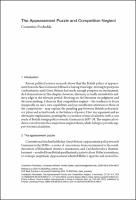Chapter The Appeasement Puzzle and Competition Neglect
| dc.contributor.author | Pischedda, Costantino | |
| dc.date.accessioned | 2022-12-22T16:05:25Z | |
| dc.date.available | 2022-12-22T16:05:25Z | |
| dc.date.issued | 2022 | |
| dc.identifier | ONIX_20221222_9788855185950_19 | |
| dc.identifier.issn | 2704-5919 | |
| dc.identifier.uri | https://library.oapen.org/handle/20.500.12657/60357 | |
| dc.description.abstract | Recent studies indicate that British appeasement towards Hitler followed a buying-time logic, i.e., it tried to postpone confrontation until Great Britain improved its military position through rearmament. However, this chapter shows that Germany actually extended its military edge over the appeasement years. Drawing on the literature on judgment and decision-making, the chapter theorizes that competition neglect – the tendency to focus myopically on one’s own capabilities and pay insufficient attention to those of the competition – may explain the puzzling gap between British policymakers’ plans and actual trends in the balance of power. The competition neglect thesis and an alternative explanation, positing the occurrence of miscalculation, are tested with a case study of British foreign policy towards Germany in 1937-38. | |
| dc.language | English | |
| dc.relation.ispartofseries | Studi e saggi | |
| dc.subject.classification | thema EDItEUR::J Society and Social Sciences::JP Politics and government::JPA Political science and theory | en_US |
| dc.subject.other | preventive war | |
| dc.subject.other | competition neglect | |
| dc.subject.other | appeasement | |
| dc.subject.other | balance of power | |
| dc.subject.other | biases | |
| dc.title | Chapter The Appeasement Puzzle and Competition Neglect | |
| dc.type | chapter | |
| oapen.identifier.doi | 10.36253/978-88-5518-595-0.11 | |
| oapen.relation.isPublishedBy | bf65d21a-78e5-4ba2-983a-dbfa90962870 | |
| oapen.relation.isbn | 9788855185950 | |
| oapen.series.number | 238 | |
| oapen.pages | 18 | |
| oapen.place.publication | Florence |

